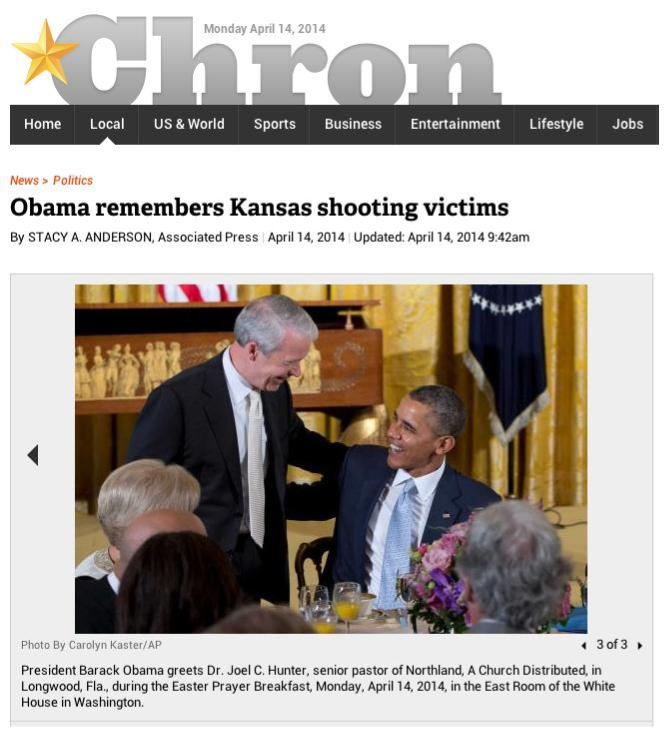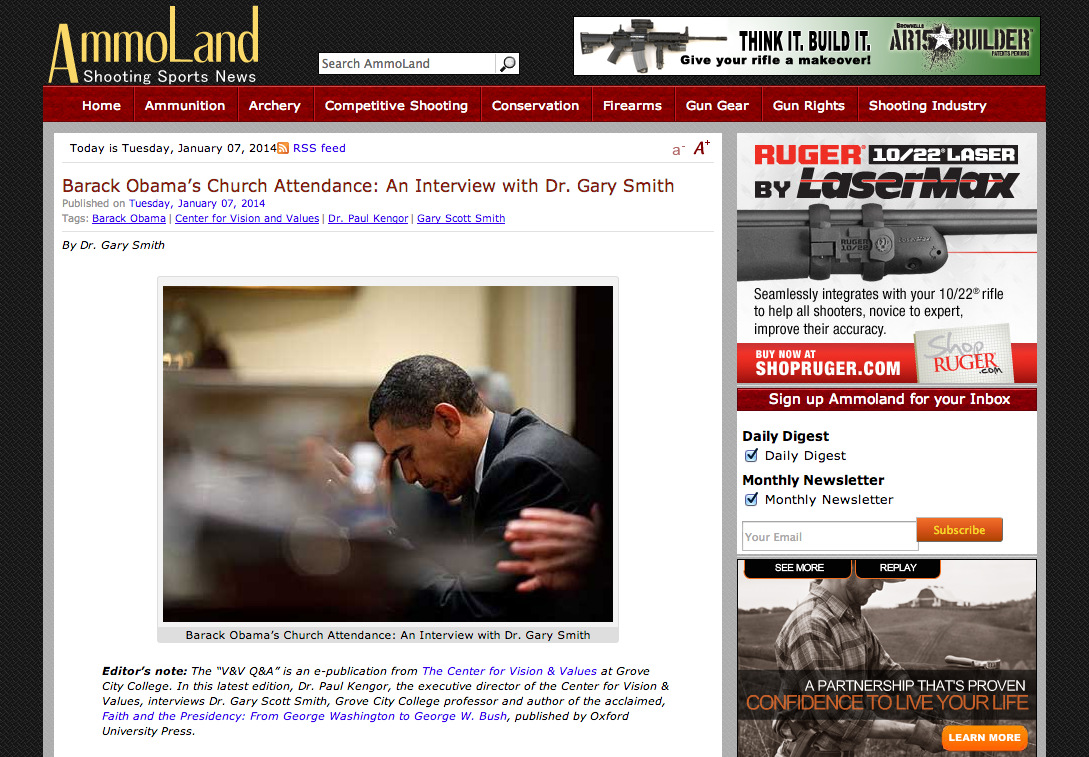Oh come all ye faithful?
Oh come all ye faithful?
Obama rarely seen in church, but advisers say his beliefs remain strong.
President Barack Obama rarely goes to church and has spent just one Christmas morning of his presidency in the pews.
But that’s not for lack of faith, members of his small circle of religious confidants say. While church isn’t a regular part of Obama’s life, prayer and reflection are, whether he’s meeting with ministers in the Oval Office or spending a few minutes reading an inspirational passage. And, if anything, they argue, his connection with God has intensified during his time in the White House.
“The president’s faith has deepened in the second term; he’s said as much,” said Joshua DuBois, a longtime spiritual adviser to Obama who led the White House Office of Faith-based and Neighborhood Partnerships during the president’s first term.
“The president’s Christian faith is not connected to or dependent upon anyone else’s beliefs about him, any particular policy issue, any moment in the news cycle or anything else,” DuBois said. “The president’s faith existed long before the While House and will continue after he closes the door to the White House for the last time.”
Critics say that wouldn’t be readily apparent from watching his public comings and goings. After disavowing his former pastor, Jeremiah Wright, and leaving Wright’s Chicago church during the 2008 campaign, Obama was widely expected to seek out a church in Washington that he’d attend with some frequency. Instead, he’s attended Sunday services only occasionally, visiting a patchwork of congregations 19 times in all since taking office, according to a POLITICO analysis of White House pool reports.
But the president embraces his faith in other ways, people who see this private side of him say.
DuBois, an ordained Pentecostal minister, and Joel Hunter, a Florida megachurch pastor, are Obama’s two closest religious advisers. A larger circle — which includes evangelical activist Jim Wallis and civil rights movement leader Joseph Lowery, among others — marks the president’s birthday each year, and many in the same group attend the Easter Prayer Breakfast and other White House events throughout the year.
Keeping up a practice that DuBois began during the 2008 campaign, they also send Obama daily devotionals — prayers, poems and other messages — that he reads on his BlackBerry.
“Reading scripture every day yields a certain amount of personal growth, and he’s done this every day for years,” Hunter said. At prayer breakfasts and other gatherings, Hunter has seen “a man who really enjoys talking about his faith” and who “seems at home.”
“It’s a good indication that he is growing in his faith,” he added.
Though Obama rarely discusses his faith, he has made clear that, if nothing else, being president has made him more attentive to it.
“I’m far more mindful of my own failings, knowing exactly what [Abraham] Lincoln meant when he said, ‘I have been driven to my knees many times by the overwhelming conviction that I had no place else to go,’” he said at the 2012 Democratic National Convention, drawing on a quotation attributed to the 16th president, though Lincoln may not have actually said it.
“The pressures of the office tend to lead presidents toward prayer. Those who have a reservoir of piety and theological understanding will draw on that, dip into that,” said Randall Balmer, a professor of religion at Dartmouth College and author of “God in the White House: How Faith Shaped the Presidency from John F. Kennedy to George W. Bush.”
Jimmy Carter, for one, would pray several times each day while in office, sometimes whispering to himself between meetings, Balmer said.
Early on in his term, Obama’s spiritual focus was on being the best possible president, Hunter said, but over the past few years he’s broadened his perspective, thinking more of his role not just as commander in chief but as a father and as a man.
“He has more paid attention to who he needs to be as a man and who other people need him to be as a person who is always trying to do the right thing but will always be blocked politically,” Hunter said.
“You never give up, you always try for political solutions, but you become increasingly aware … there isn’t a killer app, there’s not gonna be a huge move,” he added. “When problems get solved, they’re gonna be incremental, simply because that’s the only way things are being done these days in Washington.”
In addition to spending time reading and mulling over his daily devotionals, Obama occasionally talks by phone or meets in person with his spiritual advisers. There’s no formal schedule to when these conversations take place, just whenever the president wants them, advisers said.
“Every time we pray, I’ll ask him, ‘What do you want to pray for?’ And he says, ‘Well, let’s pray for the country,’” Hunter said. “The country is so on his mind. It’s not, ‘Let’s pray just for this group or just for this cause,’ it’s, ‘I want to pray for the country.’ That’s encouraging to see.”
In all, Obama has gone to services on about 6 percent of the Sundays of his presidency and just once on Christmas Day, in 2011, which also happened to be a Sunday. George W. Bush, by contrast, went to church on close to 30 percent of Sundays during his eight years in office.
All of this stokes criticism on the right, with some arguing that Obama’s professed Christian faith is a sham — or at least an overstatement — meant to make him more palatable to voters.
In an interview last fall, Fox News host Bill O’Reilly pushed DuBois on why the president “doesn’t go to church more often” and wondered whether there was any link between Obama’s departure from Wright’s church and the infrequency of his public worship. DuBois defended the president, saying Obama “leads with his relationship with Jesus” and goes to church several times a year.
One factor is that the first family is busy and prefers to use its free time to bond together at home.
“We try to go to church as much as possible, but when the kids get older, you know, Sunday is some kind of practice, rehearsal, birthday party, you know. So getting us all together on a Sunday is becoming more difficult now that the girls are getting older,” first lady Michelle Obama said in an interview on “Live with Kelly and Michael” timed to the annual White House Easter Egg Roll this year.
“But if we’re not going to church, we really try to use Sunday as family downtime where we can kind of breathe and catch up and maybe take a little nap every now and then if we’re not working,” she said.
But the key reason the president doesn’t go to church more often, DuBois and others close to him said, is because he worries that his presence detracts from other worshipers’ experience.
Obama found out how difficult it would be for him to go to church before he even became president, when he and his family were swarmed by well-wishers and photo-takers at Washington’s Nineteenth Street Baptist Church, one of the nation’s oldest black churches, on the Sunday before his 2009 inauguration.
“When folks see the line forming outside, a lot of folks who don’t attend that congregation go in,” DuBois said. “It displaces a lot of people who are members of that church or at least interrupts them.”
More than five years later, on Easter Sunday this year, the crowd at Nineteenth Street Baptist — located 3 1/2 miles up 16th Street from the White House — was enthusiastic but not overwhelmed by the Obamas’ presence. Still, the first family faced several minutes of what a reporter described as “crowd crush,” with worshipers jockeying for position as they pulled out their smartphones and tablets.
During the president’s Easter visit to the church — his only one so far this year — senior pastor Derrick Harkins acknowledged the first family’s arrival and offered prayers for them, asking that God give the president “every measure of encouragement” and “wisdom.” He also called on God to “tend to his spirit” under the weight of criticism.
After the first flurry of attention, the congregation was respectful, Harkins said. “Our members have wanted to make sure that the worship experience is one that is meaningful and supportive of [the president] and his family” and not one that overwhelms them.
And the Obamas appreciate it. “The president and the first lady are never hesitant to share that they found the worship time valuable to them,” Harkins said. “It’s absolutely genuine.”
To those who doubt Obama’s dedication to his faith, Harkins, a former adviser to the Democratic National Committee, added: “If we were to judge spiritual depth and fulfillment based on who went to church and who didn’t, there would probably be a lot of surprises. I never try to determine what the spiritual engagement of another person is. It’s an awfully pretentious thing to do about anybody, let alone the president.”
SOURCE: http://www.politico.com/story/2014/12/president-barack-obama-religion-113791.html



